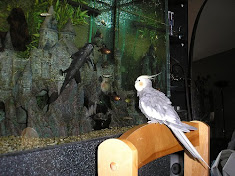2.) Savannahs are a larger breed of cat. They can reach weights of 15 -20 pounds or more. While you may not mind a large loving lump of fur greeting you at the door every day, you'll have to consider if your home has enough space for you, your family and your savannah, too.
 |
| Savannah Kitten by Karen Leigh |
4.) Savannahs are highly intelligent. They need lots of stimulation and interaction. They can learn to play fetch with small dowels or pencils. They are very curious and will explore closets, cupboards and other areas of your home with abandon. They can be trained to walk on a leash with a harness or leash jacket, and seem to enjoy going out and about. Owners have reported that savannahs have learned how to do things like turn on light switches, pat at the remote control buttons to turn on or off the tv or stereo, turn on and off paddle-style faucet handles, and even one who learned to turn doorknobs so that he could enter or exit any interior room he pleased, when he pleased.
5.) Savannahs are cats. As with other cats, they typically don't take too well to changes in their diet, or their environment. If you do need to change your savannah's food, you'll want to do so gradually, adding a bit more of the newer food in with the old, until you've switched over completely. One owner reports that her savannah shows displeasure with new food by dumping the entire bowl over and scattering the offensive offering all over the kitchen floor. Remember, savannahs are highly intelligent, and will find ways of making their opinions known.
6.) Savannahs are very vocal animals. They have a distinctive cry and can be quite loud about it, too. Thin-walled condos may not be the best environment for a savannah, unless your neighbors don't mind.
 |
| Adult Savannah by miheco |
8.) Savannahs are only a few generations from the wild. The earlier the generation, say an F1 or F2 savannah, the closer to a wild animal they are. They will see other small animals in the home, like birds, hamsters, guinea pigs, fish, mice and the like as prey. Their hunting instincts combined with their high intelligence will have them figuring out ways to open cages, aquariums and other small animal habitats. It is probably best if you have a collection of small pets to purchase a later generation savannah, as it will be less inclined to see Bongo the hamster as lunch.
9.) Savannah males are sterile, but should be neutered anyway. They will still have the hormones, and won't be aware that they are sterile. To avoid spraying and marking of territory, aggressive behaviors towards female cats and other unpleasant incidences, you should have them neutered at about 5 to 6 months of age, as you would any other domestic male cat.
10.) Savannahs are hybrids, and are difficult to breed. This makes them a bit rare and exotic. Therefore, the kittens, especially the F1 and F2 generations, will be more expensive than other breeds and later generations of savannahs, such as F3 and F4 kittens. Paying more or less for a savannah isn't always an indication of the quality of the kitten or its breeding stock. It has more to do with what generation of cat you are looking into purchasing.
Author Resource: Written by Ryan Petersen
Urban Safari Cattery is home to the finest savannah cat and bengal kitten breeding with information regarding the history and development of this beautiful breed. Visit online today.



0 comments:
Post a Comment